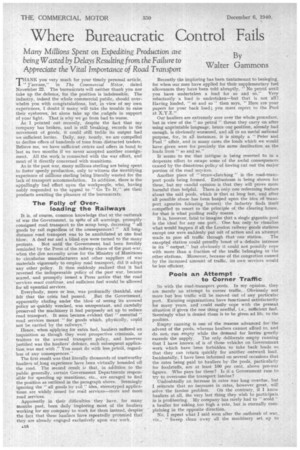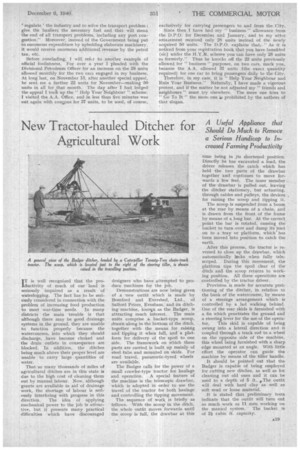Where Bureaucratic Control Fails
Page 20

Page 21

If you've noticed an error in this article please click here to report it so we can fix it.
Many Millions Spent on Expediting Production are beingWasted by Delays Resulting from the Failure to Appreciate the Vital Importance of Road Transport
By Walter Gammons
'THANK you very much for your timely personal article, 1 " yaccuse," in The Commercial Motor, dated November 22. The bureaucrats will neither thank you nor take up the defence, for the position is indefensible. The industry, indeed the whole commercial public, should overwhelm you with congratulations, but, in view of my own experiences, I doubt if many will take the trouble to raise their eyebrows, let alone take up the cudgels in support of your fight. That is why we go from bad to worse.
As I pointed out recently, despite the fact that my company has broken, and is still breaking, records in the movement of goods, it could still treble its output had we sufficient lorries. Daily, nay, hourly, we are compelled to decline offers of hundreds of tons from distracted traders. Believe me, we have sufficient orders and offers in hand to last us two months if we never accepted another consignment. All the work is connected with the war effort, and most of it directly concerned with munitions.
As in the past war, many millions sterling are being spent to foster speedy production, only to-witness the mortifying experience of millions sterling being literally wasted for the lack of transport accommodation. In addition, there is the appallingly bad effect upon the workpeople, who, having nobly responded to 'the appeal to "Go To It," see their products awaiting the pleasure of the bureaucrats.
The Folly of Over loading the Railways
It is, of course, common knowledge that at the outbreak of war the Government, in spite of all warnings, promptly consigned road transport to the scrap heap, decreeing " all goods by rail regardless of the consequences! " All longdistance road transport was to be annihilated at one foul blow. A deaf ear and a blind eye were turned to the many protests. Not until the Government had been forcibly reminded by the Press of the railway chaos of the past-war, when the dire necessity arose for the Ministry of Munitions to circularize manufacturers and other suppliers of war materials vigorously to employ road transport, did it adopt any other policy. It then suddenly realized that it had reversed the indispensable policy of the past war, became scared, and promptly issued a Press notice that the road 'services must continue, and sufficient fuel would be allowed for all essential services.
Everybody, more or less, was profoundly thankful, and felt that the crisis had passed. But the Government, apparently chafing uncler the blow of seeing its avowed policy so quickly wrecked, was unrepentant, and carefully preserved the machinery it had purposely set up to reduce road transport. It soon became evident that '' essential " road services meant " for goods which, physically, could not be carried by the railways."
Hence, when applying for extra fuel, hauliers suffered an inquisition as though they were prospective criminals, or traitors to the avowed transport policy, and however justified was the hauliers' defence, each subsequent application was met with You must do with less petrol, regardless of any consequences."
The first result was that literally thousands of trustworthy hauliers of,long experience have been virtually hounded off the road. The second result is that, in addition to the public generally, certain Government Departments responsible for speeding up munitions, etc., are enraged to find the position as outlined in the paragraph above. Seemingly ignoring the " all goods by rail " idea, stereotyped applications are widely issued for road services—more and more road services.
Apparently in their difficulties they have, for many months past, been daily imploring most of the hauliers working for my company to work for them instead, despite the fact that these hauliers have repeatedly protested that they are already engaged exclusively upon war work.
.1.1S Recently the imploring has been tantamount to besieging, for when our men have applied for their supplementary fuel allowances they have been told abruptly, "No petrol until you have undertaken a load for, and so." Very reluctantly a load is undertaken—ut that is not all Having loaded, "so and so" then says, "Here are your papers for your back load; you must report to the Pool at X.Y.Z."
Our hauliers are extremely sore over the whole procedure, but in view of the " no petrol " threat they carry on after using unprintable language, hence our position, already bad enough, is obviously worsened, and all to no useful national purpose, for, in all instances, it is simply a " Peter and Paul " affair, and in many cases the loads which we would have given were for precisely the same destination as the loads from "so and so."
It seems to me that intrigue is being resorted to in a desperate effort to escape some of the awful consequences caused by the disastrous policy of having cut out the major portion of the road seryices.
Another piece of "straw-clutching " is the road-transport pools being formed. Enthusiasm is being shown for these, but my candid opinion is that they will prove more harmful than helpful. Thereds only one redeeming feature about the said pools, which is that at long last, and after all possible abuse has been heaPed upon the idea of transport agencies (clearing houses) the industry finds itself compelled to resort to the principle of the clearing house, for that is what pooling really means.
It is, however, fatal to imagine that a single gigantic pool is the ideal for any one port. One has only to visualize what would happen if all the London railway goods stations except one were suddenly put otit of action and an attempt made to pass all traffic through that one station. The excepted station could proudly boast of a definite increase in its "output," but obviously it could not possibly cope with more than a fraction of the traffic belonging to the other stations. Moreover, because of the congestion caused by the increased amount of traffic, its own services would be less efficient.
Pools an Attempt to Corner Traffic
So with the road-transport pools. In my opinion, they are merely an attempt to corner traffic. Obviously not more but less traffic will be moved out of any particular port. Existing organizations have functioned satisfactorily for many years, and could easily cope with the present situation if given the one thing needful, i.e., sufficient fuel. Seemingly what is denied them is to be given ad lib. to the poolites.
Empty running is one of the reasons advanced for the advent of the pools, whereas hauliers cannot afford to, and do not, run empty while the demand for lorries greatly exceeds the supply. The only deliberate empty running that I have known of is of those vehicles on Government work which have been forbidden to take back loads so that .they can return quickly for another outward load. Incidentally, I have been informed on several occasions that the rates being paid to hauliers by the pools, particularly for foodstuffs, are at least 100 per cent, above pre-wat figures. Who pays for these? Is if a Government ruse to try to overcome the transport famine? Undoubtedly an increase in rates was long overdue, but I reiterate that no increases in rates, however great, will solve the famine problem. On the contrary, if I knou hauliers at all, the very last thing they wish to participate in is profiteering. My company has rarely had to "scold' a haulier for asking. too high a rate, but is eternally com• plaining in the opposite direction. No, I repeat what I said soon after the outbreak of war, viz., " Sweep clean away all the machinery set up to regulate' the industry and to solve the transport problem ; give the hauliers the necessary fuel and that will mean the end of all transport problems, including any port congestion." Moreover, instead of the Government being put to enormous expenditure by upholding elaborate machinery, it would receive enormous additional revenue by the petrol tax, etc.
Before concluding, 1 will rekr to another example of official foolishness. For over a year I pleaded with the Divisional Petroleum Officer for an increase on the 28 units allowed monthly for the two cars engaged in my business. At long last, on November 13, after another special appeal, he sent me a further 22 units for November—making 50 units in all for that month. The day after I had lodged the appeal I took up the " Help Your Neighbour" scheme. I visited the A.A. Office, and in less than five minutes was out again with couivns for 37 units, to be used, of course,
exclusively for carrying passengers to and from the City.
Since then I have had my " business " allowance from the D.P.O. for December and January, and to my utter amazement received only 28 units instead of the newly acquired 50 units. The D.P.O. explains that, " As it is noticed from your registration book that you have benefited (sic) under the H.Y.N. scheme you can have only 28 units as formerly." Thus he knocks oft the 22 units previously allowed for " business " purposes,. on two cars, mark you, because the A.A. allowed 37 units (the exact quantity required) for one car to bring passengers daily to the City.
Therefore, in my case, it is "Help Your Neighbour and Ruin Your Business." Naturally, I have made a vigorous .protest, and if the matter be not adjusted my " friends and neighbours" must try elsewhere. The more one tries to "Go To It" the lilOre. one j.s prohibited by the authors of that slogan.




















































